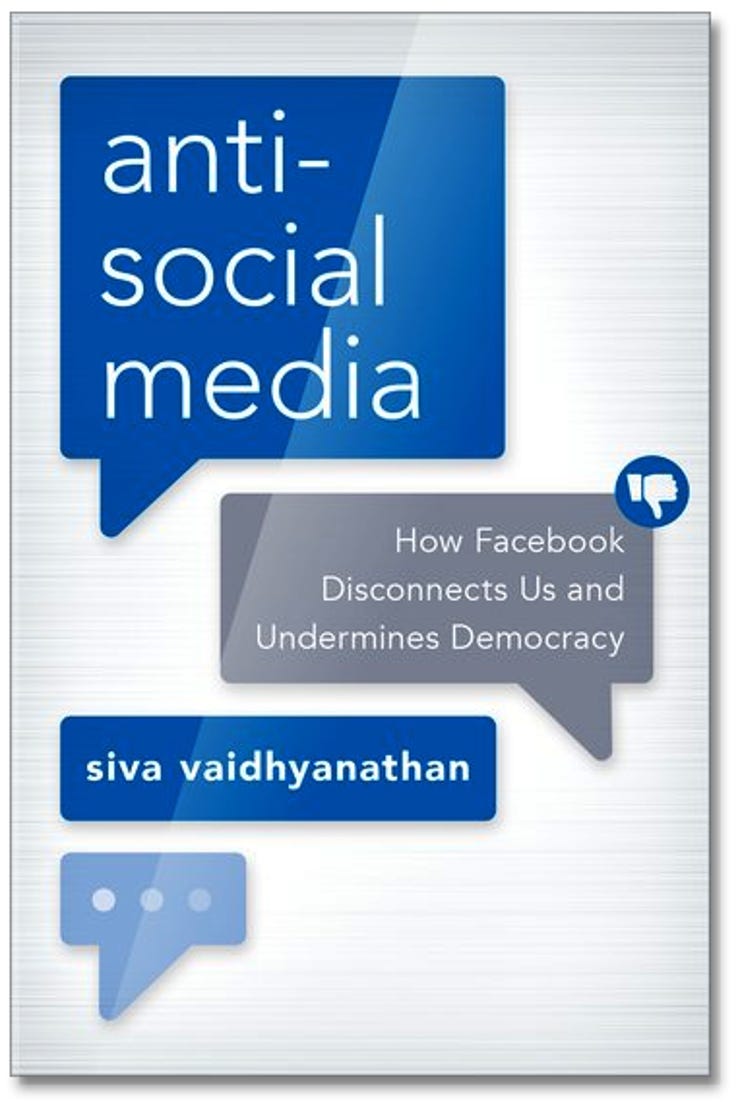Antisocial Media, book review: Good intentions gone bad


Antisocial Media: How Facebook Disconnects Us and Undermines Democracy • By Siva Vaidhyanathan • Oxford University Press • 276 pages • ISBN: 978-0-19-084116-4 • £18.99 / $24.95
In some of her later novels (for example, They Came to Baghdad), Agatha Christie posited a shadowy, non-governmental group of powerful people who were behind all sorts of undesirable global developments -- civil unrest, manipulated volatility on the financial exchanges, disruptions to peace in our time. Reading those books as a teenager, I thought she sounded paranoid.
Now, we have Facebook. In Antisocial Media: How Facebook Disconnects Us and Undermines Democracy, University of Virginia professor Siva Vaidhyanathan details the many ways Facebook divides us. While CEO Mark Zuckerberg talks glibly about connecting the world, authoritarian governments in Indonesia, Cambodia, and the Philippines have used Facebook to build support and crush opposition. The effect is worst in countries where Facebook's Free Basics, or 'internet.org', is zero-rated against mobile phone users' data caps, creating a strong economic incentive to use Facebook rather than other information sources, and where Facebook has moved independent news coverage out of users' feeds into a separate, less-visited area.
However, even in India, where the telecommunications regulator backed network neutrality and refused to allow Free Basics, Facebook has enabled Narenda Modhi and his Bharatiya Janata Party to harness armies of trolls to spread propaganda and bigotry. Agatha Christie, were she around to see this, could feel at least partly vindicated.
Vaidhyanathan is willing to give Zuckerberg this much credit: this wasn't his plan, or not exactly. Vaidhyanathan looks more closely at Sheryl Sandberg, who built Google's advertising engine before moving to Facebook in 2008 to do the same for a four-year-old company that had not yet decided its business model. In addition, Vaidhyanathan notes that Facebook is just one -- albeit very large -- piece of an ecosystem that includes 4Chan, 8Chan, Reddit, and the traditional media. False information can be seeded anywhere, spread in the background, and continue gaining currency until it reaches the mainstream media. It can be shared -- and amplified -- on Facebook at any or all of those stages. I often say that Twitter is the democratisation of behaviour the tabloids have engaged in for decades; Facebook and its 2 billion sharing users are the culmination of the concerns that Neil Postman, Vaidhyanthan's early mentor, wrote about in his 1985 book, Amusing Ourselves to Death. Postman's focus was primarily television, but Facebook's level of engrossing distraction is even more damaging, since you never have to finish a thought before skipping to the next 'wow!'.
The consequence, Vaidhyanathan writes, is the hollowing-out of our political system -- for varying values of 'our', since unlike most US-based authors Vaidhyanathan takes a global view. Even if Hillary Clinton had won the Electoral College, even if the UK had voted to stay in the EU, even if any number of other things, he writes, we would still be facing this problem: we have lost the ability to think collectively about hard problems, even when, like climate change, they are existential threats.
SEE: Sensor'd enterprise: IoT, ML, and big data (ZDNet special report) | Download the report as a PDF (TechRepublic)
Of course disinformation has a long, long history. In Western countries, despite their 'corporate social responsibility' initiatives, companies like Exxon, Philip Morris, and newly-accused Johnson & Johnson spread disinformation and division for decades before Facebook was founded. Facebook has been the accelerant on a scale we've never seen before, but it is not a root cause. Vaidhyanathan notes the US's shift away from promoting competition through antitrust law, and from grand plans for progress to narrow ones for 'innovation' -- the difference, as a friend commented once, between the future being something we plan for and something that happens to us.
As a counter-response, Vaidhyanathan recommends strengthening our democratic institutions, including the press, invoking antitrust law to break up Facebook and prevent future acquisitions, and using the power of the state to push companies to behave responsibly. As he admits, it's a hard road.
RECENT & RELATED CONTENT
Facebook bug exposed private photos of 6.8 million users
Up to 1,500 apps built by 876 developers could have had accessed the private photos of 6.8 million users.
The biggest culprit in the Facebook debacle
As the British government reveals some of Facebook's innards, who comes out worst?
Facebook: UK Parliament published "cherrypicked" documents
The internal Facebook documents, seized from now-defunct business Six4Three, reveal how Facebook gave some app developers preferential treatment, as well as the value Facebook placed on user data.
ACCC goes after Google, Facebook in the name of fake news and data transparency
The consumer watchdog wants to protect the integrity of news content in Australia by holding digital giants accountable over what is available and shared on their platforms. It also wants regulation and transparency around how they collect and use data.
Facebook AI researcher urges peers to step out into the real world
Addressing the NeurIPS annual conference on machine learning, Facebook AI researcher Joelle Pineau told those studying reinforcement learning they need to branch out beyond the confines of their simulated environments and incorporate more of the natural world into their work.
Read more book reviews
- It Doesn't Have to Be Crazy at Work, book review: Choose calm instead
- The Internet, Warts and All, book review: How to regulate a messy system
- The Evolved Executive, book review: Banishing fear from the workplace
- Click Here to Kill Everybody, book review: Meeting the IoT security challenge
- Bad Blood, book review: The rise and fall of Theranos